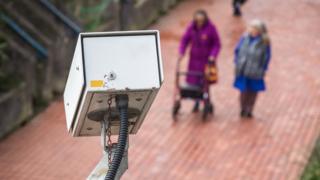Twitter Demands AI Company Stops Collecting Faces
 Image copyright Getty Images
Image copyright Getty Images Twitter has demanded an AI company stop taking images from its website.
Clearview has already amassed more than three billion photographs from sites including Facebook and Twitter.
They are used by the FBI and Department of Homeland Security and more than 600 other law-enforcement agencies around the world to identify suspects.
In a cease-and-desist letter sent on Tuesday, Twitter said its policies had been violated and requested the deletion of any collected data.
- Emotion-detecting tech should be restricted by law – AI Now
- US lawmakers concerned by accuracy of facial recognition
Twitter’s developer agreement policy says: “Information derived from Twitter content may not be used by, or knowingly displayed, distributed, or otherwise made available to any public-sector entity for surveillance purposes.”
According to the New York Times, the Clearview app includes programming that could pair the images with augmented-reality glasses that would allow users to identify the names and addresses of anyone they saw.
Clearview has not yet responded to a request for comment.
‘Dangerous behaviours’
US senator Ron Wyden said on Twitter Clearview’s activities were “extremely troubling”.
“Americans have a right to know whether their personal photos are secretly being sucked into a private facial-recognition database,” he said.
“Every day, we witness a growing need for strong federal laws to protect privacy.”
Senator Edward J Markey also shared his concerns, in a letter sent to the company on Wednesday, suggesting its technology could “facilitate dangerous behaviours and effectively destroy individuals’ ability to go about their lives anonymously”.
It follows suggestions the European Commission is considering a five-year ban on the use of facial recognition in public areas.
Regulators want time to work out how to prevent the technology being abused.
Concerns over the use of facial-recognition technology have grown recently, even in China, where the government continues to embrace its uses.
Some 74% of Chinese respondents in a recent survey by the Beijing research institute said they wanted the option to be able to use traditional ID methods over the tech to verify their identity.
READ MORE HERE
